The Beatles’ music seemed to dominate the world throughout the 1960s, but in 1967, the band really did take over the international airwaves during the first-ever international broadcast. Although the BBC curated the event, many other countries contributed to the on-air phenomenon, including Australia, Austria, Canada, Denmark, France, Italy, Japan, Mexico, Spain, Sweden, Tunisia, the USA, and West Germany.
Videos by American Songwriter
In the summer of 1967, the Beatles were an obvious choice to represent Britain. Fresh off the heels of their June 1, 1967, release ‘Sgt. Pepper’s Lonely Hearts Club Band’ and with other iconic albums under their belt like ‘Revolver’ and ‘Rubber Soul,’ the band had a plethora of songs to choose from. But instead of cherry-picking their best pre-recorded track, John Lennon opted to write a new song specifically for the BBC broadcast.
The Last-Minute Composition Became One of The Band’s Most Enduring Tracks
The BBC decided to produce the program “Our World” to highlight the potential of satellite communications to connect global communities in ways never before possible. So, when the time came for the Beatles to compose a new song especially for the broadcast, the BBC only had one request: make it straightforward enough that audiences around the world could understand the message. By the end of the writing and recording process, it was clear John Lennon understood the assignment with the now-iconic track: “All You Need Is Love.”
Of course, he took his time. “The time got nearer and nearer, and they still hadn’t written anything,” manager Brian Epstein recalled in Anthology (via BeatlesBible). “Then, about three weeks before the programme, they sat down to write. The record was completed in ten days. This is an inspired song because they wrote it for a worldwide programme, and they really wanted to give the world a message. It could hardly have been a better message. It is a wonderful, beautiful, spine-chilling record.”
Bandmate Paul McCartney agreed, ceding the entire song to Lennon with a few ad-lib exceptions from him and George Harrison. “Knowing that millions of the viewers would not understand English, John kept the chorus as simple as possible. It was the philosophy of ‘Sgt. Pepper’ and the era reduced to five words,” McCartney explained in Many Years From Now. “The chorus, All you need is love, is simple, but the verse is quite complex. In fact, I never really understood it. It was a good song that we had handy that had an anthemic chorus.”
The Beatles’ First International Broadcast Had A Star-Studded Backing Band
The BBC’s “Our World” highlighted the global community with broadcast performances from around the world, but the broadcasting company didn’t allow just anyone on the show. Event organizers purposefully excluded politicians and heads of state, instead focusing on the apolitical aspects of global society. As drummer Ringo Starr recalled, “It was for love and bloody peace. I even get excited now when I realize that’s what it was for: peace and love, people putting flowers in guns” (via BeatlesBible).
But while there were no political figures on air, there were certainly public figures of another kind. The Beatles performed live with several contemporary stars, including Mick Jagger, Keith Richard, Keith Moon, Eric Clapton, Marianne Faithfull, Graham Nash, Pattie Harrison, Jane Asher, and Hunter Davies. The broadcast was technicolor to the nth degree, featuring all performers in bright, colorful clothing surrounded by flowers and balloons to match.
“We decided to get some people in who looked like the ‘love generation,’” George Harrison explained in Anthology (via BeatlesBible). “If you look closely at the floor, I know that Mick Jagger is there. But there’s also an Eric Clapton, I believe, in full psychedelic regalia and permed hair, sitting right there. It was good: the orchestra was there, and it was played live. We rehearsed for a while, and then it was: ‘You’re on at 12:00, lads.’ The main upstairs pointed his finger, and that was that. We did it.”
Photo by Evening Standard/Hulton Archive/Getty Images












Leave a Reply
Only members can comment. Become a member. Already a member? Log in.